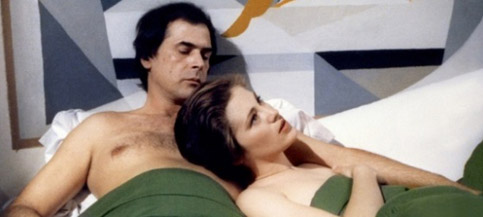Sole Criterion: Identification of a Woman
By Brett Ballard-Beach
March 29, 2012
The specific woman of the title is never made explicitly clear, which is par for the course with Antonioni who seems to have staked and made his reputation on films with plots that can be easily relayed in a sentence or two but which become wholly ambiguous when viewed cinematically. The big picture seems perfectly understandable and lucid, but the specific details confound when one stops to ponder. Like Blow-Up’s protagonist, a photographer who obsesses at length over a picture he has snapped, convinced it contains proof of… a murder, a liaison, a conspiracy, many of Antonioni’s heroes and heroines become waylaid by similar nagging doubts, many times in relation to the physical environment around them.
Identification of a Woman opens with a spatially disorienting shot that only resolves itself a few seconds later. The camera hangs over and slightly above the entryway inside the lobby of an apartment complex. For a brief second, the architecture and the stillness call to mind the waiting area outside the elevator of The Overlook Hotel before it is (twice) consumed by torrents (Torrance?) of blood. But this isn’t a horror film or a thriller, and though there are elements of paranoia and mystery at play, Antonioni doesn’t push them too hard, either. A man enters carrying a suitcase, climbs the stairs to his apartment, fumbles for his key and notes under his breath and on a notepad he carries with him, something to the effect of “She may be gone, and with her, her suspicions. But her alarm system lives on.”
For film director Nicollo, the woman of the title could be this unseen ex-wife, one of the two disparate women he becomes involved with in her aftermath, or the elusive muse he seeks for his next, undefined project. As the film progresses, it becomes apparent that Nicollo represents a stand-in for Antonioni through which he can furnish an auto-critique, a point driven home late in the film by actress Ida - the second of the two women he becomes involved with, who scorns him with the putdown: “You Italian directors seem to be paid to be angry with the world.”
The audience sees Nicollo make half-hearted efforts at writing, flirting with being a director for hire on an outside project, and he is recognized by others, but largely he appears to be suffering through a bout of writer’s (and director’s) block as severe as the protagonist in Fellini’s 8 1/2, who by comparison, was also bedeviled by concurrent romantic entanglements, and at a loss on how to proceed with his current project. There was some resolution (and to an extent, joy therein) to his dilemma, if only metaphorically, but Nicollo finds no such peace. He is uneasy with himself, in his relationships, and with the world around him. This is typified by his first encounter with Mavi, the love interest whose eventual disappearance drives him to distraction. He meets her over the phone, answering it while waiting to visit his sister at her medical practice, and he asks her to verbally sketch herself, explaining that he’s “uneasy when I can’t visualize the person I’m talking to . . .”
Soon thereafter… well, actually, the dynamics of time is one of the more unsettling studies of the film. There are at least a few flashbacks that aren’t overtly announced as such and a recurring theme is to see the passage of light from day to night as the camera remains static on an interior, but otherwise Antonioni, acting as his own editor, opts for intentionally jarring cuts from one place and point in time to another that give the impression, upon consideration, of time-traveling (a not-irrelevant notion given the film’s concluding scene). Another jarring effect, done only once by my count, but producing uneasiness that spreads both forward and back through the film, is a false POV shot, created by a hidden cut. Having arrived at Mavi’s apartment to squirrel her away to a house in the country for a few days, and with well-founded suspicions that he may be being tailed at the behest of a jealous ex- (or current) suitor of hers, Nicollo goes out to her balcony and peers over to see his car below. The next second, we see Nicollo and Mavi enter from frame right and get into the car. At once the omnipotence of the director lording over the proceedings is evoked, Nicollo’s natural power one presumes, but also the sense that even as he struggles to regain authorial control, someone out there is still spying on him, someone who seems incapable of losing the upper hand.
Continued:
1
2
3
4




